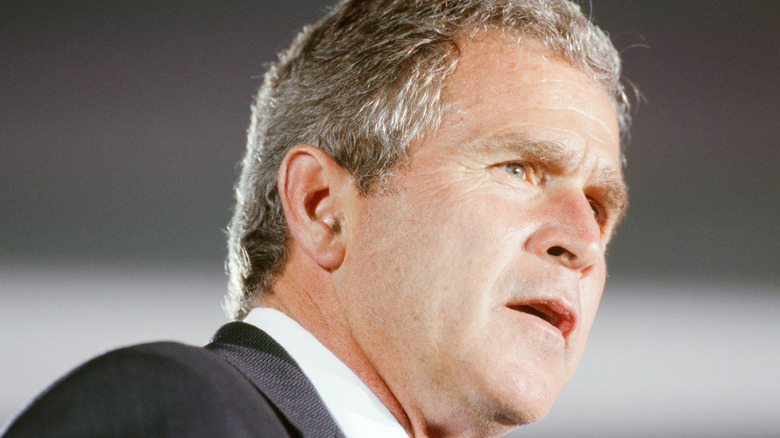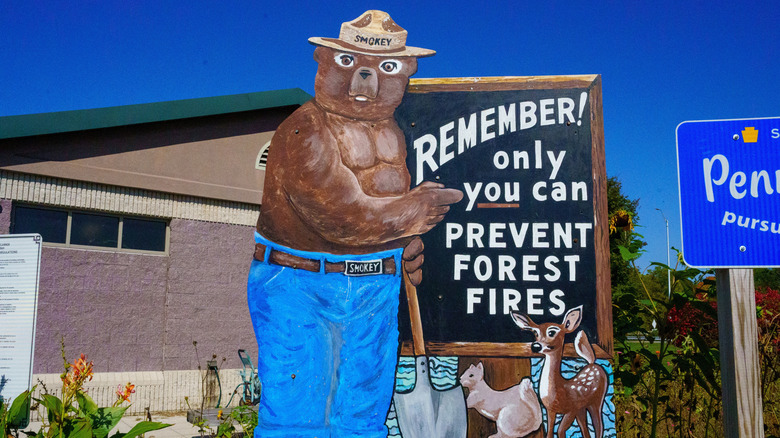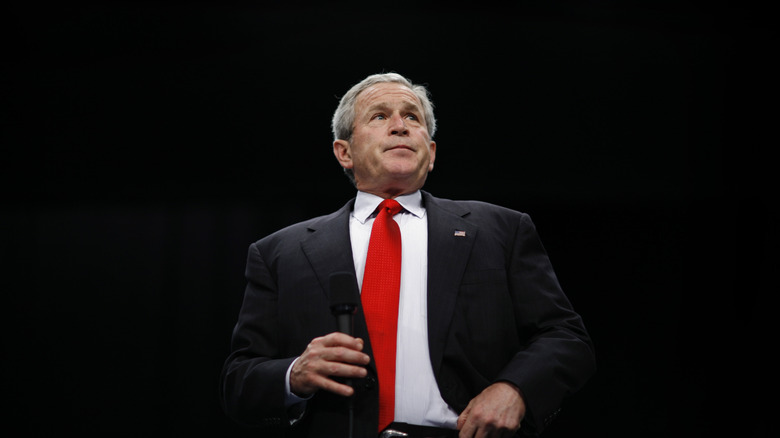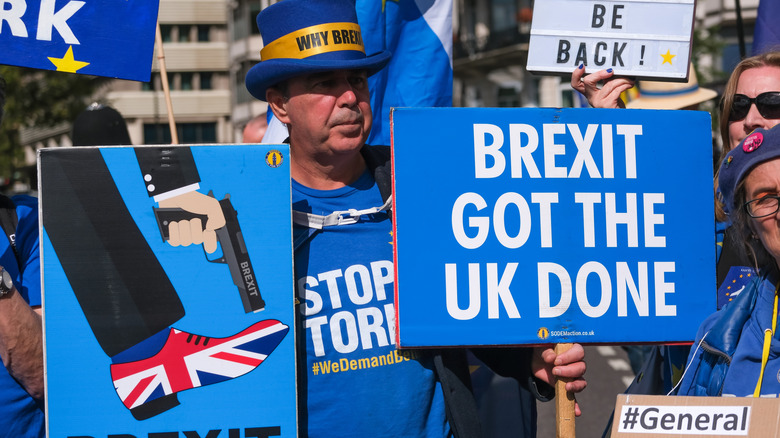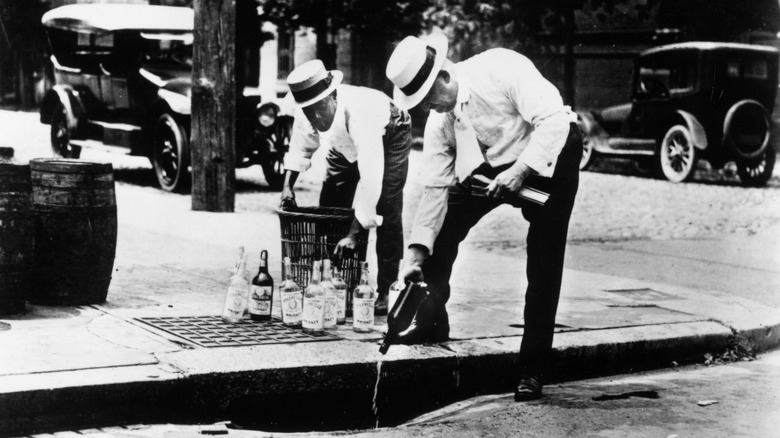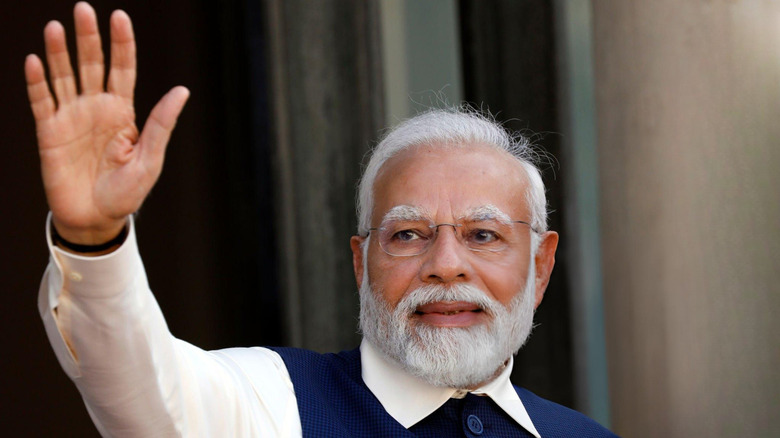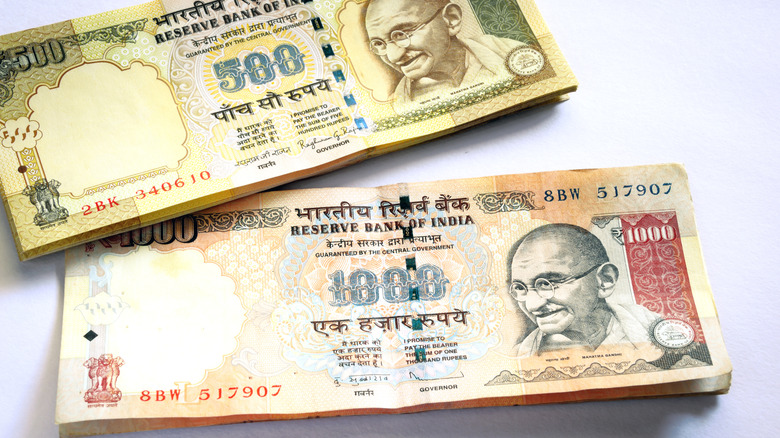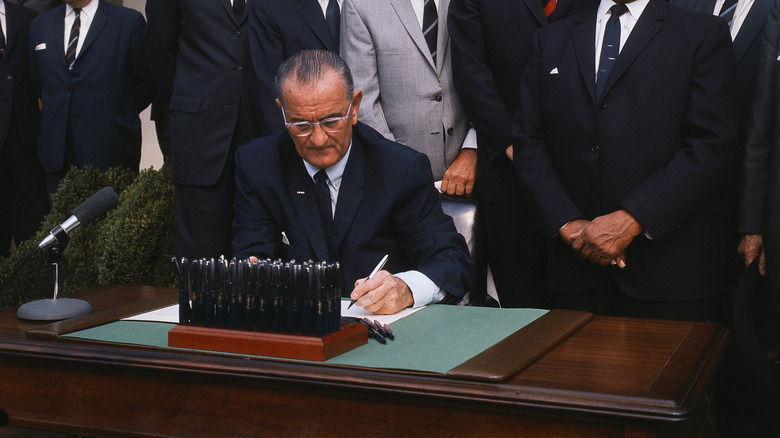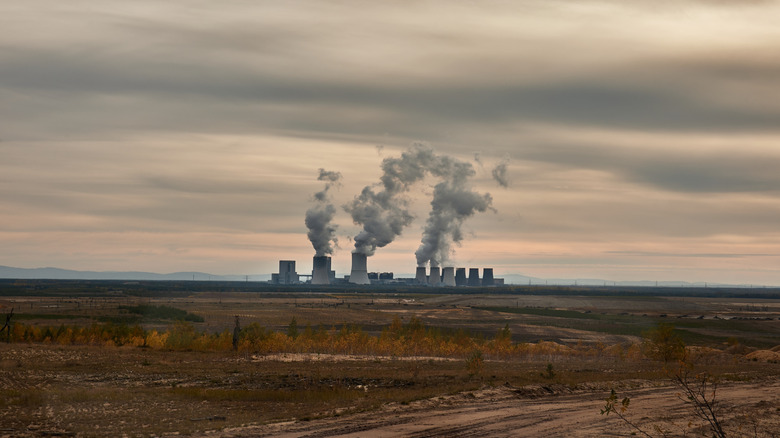Popular Government Campaigns That Actually Backfired
Most democracies around the world rely on some degree of popularity with the public to be able to function. In democracies, governments are generally voted in based on policies, laws, and acts that they pledge to execute during their period in office. When they win, it is expected that they deliver at least partially on what they promised. Whether they do or not at the end of the day is another matter.
So governments are always on the lookout for campaign ideas that will both be popular with the public and make a measurable difference in their lives, and this has led to some imaginative policymaking over the years. When a campaign catches the public's imagination and is put into practice successfully, it may come to stand as a government's defining act and the ultimate legacy of their time in power. However, no matter how well-thought-out or well-intentioned a campaign may appear on launch, governments are liable to see their plans backfire in the most unexpected ways.
Smokey Bear
The last few years have seen wildfires become even more ferocious than ever before, with scientists confirming that climate change is making conditions drier in many areas of the United States and exacerbating their spread. But they are not simply a modern phenomenon, as one of America's most memorable government campaigns from nearly eight decades ago makes clear.
Smokey Bear, with his famous slogan "Only YOU can prevent forest fires," emerged in the 1940s, encouraging outdoor recreationists to make the utmost effort to manage their own campfires and other open flames that might spread to wild vegetation. The need for such advice first arose in World War II, when the threat of shelling from Japanese submarines setting coastal Californian forests alight raised the danger of compounding fires caused by citizens and making the fires too numerous to manage.
Smokey has proven to be an effective communication tool, with generations of Americans now trained to believe that forest fires need to be snuffed out. But experts now argue that naturally occurring fires are part of the life cycle of a forest and serve the purpose of burning away dry old vegetation to make way for the new. When small-scale forest fires are prevented, it means a build-up of flammable material, which sadly means that when it does catch fire, there is more fuel to allow it to spread, and it ultimately becomes far more destructive and dangerous.
D.A.R.E.
Many adult Americans will remember those times during their childhood and adolescence when they were made to file into the school auditorium to be met with the sight of a stern-looking police officer. The officer's message to the kids? Some version of "Just say no to drugs."
The scheme was known as Drug Abuse Resistance Education, or "D.A.R.E." for short. Founded in Los Angeles as a scheme to curb drug use and associated crime, D.A.R.E. quickly spread across the United States, with those behind it convinced that the strong messaging that encouraged autonomous decision-making as an addiction-prevention tool was effective.
However, D.A.R.E. also proved controversial. Studies conducted a decade after its launch have shown that D.A.R.E. had no discernible impact on drug use and addiction across the country, and in fact, it is now believed the scheme may have had the effect of turning kids on to the subject of drugs or making them aware of substances of which they were previously ignorant. It was also believed to have made kids more curious about drugs, because the guidance did not explain the substances' effects and failed to properly factor in the power of peer pressure.
The War on Drugs
On June 17, 1971, President Richard Nixon declared war on drugs. Framing drug abuse as a scourge on the lives of everyday American families, he announced that he had received bipartisan support to pledge hundreds of millions of dollars — billions today — to destroying supply lines of drugs at home and abroad and ridding the United States of drug addiction through illegalization and treatment. The scale of the war on drugs grew in the 1980s under President Ronald Reagan, who greenlit greater military intervention against organized crime and, in 1986, passed the Anti-Drug Abuse Act which escalated prison sentences for drug offenses.
It was ultimately one of the most long-running and expensive campaigns in American history, but experts now believe that the war on drugs has backfired in several ways. To begin with, illegalization created a black market, leading to the formation of powerful drug cartels which have led to mass violence and destabilization in many countries, particularly in South America. The attempted capture of cartel leaders has typically seen an increase in drug-related violence in countries like Colombia and Mexico, with the pressure of arrest leading to rasher decision-making and greater ruthlessness among traffickers, and the development of more underhanded methods to keep drugs flowing into the U.S. New gangs have historically formed to fill cartel power vacuums. Meanwhile, harsh drug-crime sentencing has led to an explosion in America's prison population, with no sign that the punitive measures have in any way impacted drug use across the board. In fact, addiction has increased in the U.S. in recent years as a result of prescription opioids, and it is arguable that the legacy of Nixon's drug policy has left generations of governments poorly equipped to deal with this new public health threat.
The War on Terror
It turns out U.S. presidents have a habit of declaring war on abstract things that they are later unable to claim victory over. In October 2001, reacting to the horror across the Western world at the atrocities of the September 11 terror attacks that claimed the lives of 2,977 people plus those of 19 hijackers, President George W. Bush declared a "Global War on Terror." A multinational military campaign including the U.K. and several other U.S. allies, it saw hundreds of thousands of troops deployed in Afghanistan and Iraq, countries believed to be home to non-state terrorist cells intent on committing further attacks against the West.
Though controversial, the War on Terror did enjoy popular support as Americans urged the government to find Osama Bin-Laden, the leader of al-Qaida and the mastermind behind the 9/11 attacks. (Bin-Laden was eventually shot and killed by a U.S. SEAL team at his compound in Pakistan in 2011.) Its scope was ambitious. "Our war on terror begins with al-Qaida, but it does not end there. It will not end until every terrorist group of global reach has been found, stopped, and defeated," Bush stated (per the George W. Bush Library). However, later analysis has shown that the campaign failed in many of its objectives, and that the military deployments provoked a backlash leading to further retaliatory attacks. Today, Afghanistan is back in the hands of the Taliban, the group accused of harboring al-Qaida, following the withdrawal of American troops in 2021. The War on Terror is now believed to have cost $6 trillion and been the cause of 800,000 deaths.
Brexit
In 2012, David Cameron, the British prime minister and leader of the Conservative Party, promised to hold a referendum on the United Kingdom's membership in the European Union. Though a supporter of EU membership, Cameron was under political pressure from Euroskeptics in his own party as well as the U.K. Independence Party, which threatened to attract votes from Conservatives at upcoming elections.
The referendum was held in 2016 and saw 51.9% of the public vote to leave the EU. Cameron, who had campaigned to remain, stepped down. In his wake, the new Conservative Prime Minister Theresa May took up the reins. Though a remainer herself, the result of the election meant her government interpreted the result as a clear mandate from the people for withdrawal, despite few technical details being laid out beforehand. May's difficulty in negotiating a withdrawal agreement with the EU that would get through the House of Commons saw her too resign as PM, to be replaced by Brexit supporter Boris Johnson.
Prior to the referendum, pro-Brexit campaigners had claimed withdrawal offered many benefits, such as greater sovereignty, but the reality of what Brexit would mean — leaving the single market and imposing a border down the Irish Sea, among countless others — led most experts to frame Brexit as economically self-defeating. Now, the government was tasked with implementing the withdrawal in a way that honored the supposed will of the people, while both singing its praises publicly and trying to minimize the potential economic damage that it would undoubtedly involve. Finally, after years of political wrangling and chaos, the U.K. left the EU on February 1, 2020. However, it did so as a weaker trading partner to its nearest neighbors, and economic challenges and the question of its future relationship with the EU remain.
Prohibition
Humanity has made and consumed alcohol for thousands of years, with the earliest evidence of winemaking in what is now the country of Georgia dating back to around 6000 B.C. Of course, today we are increasingly aware of the health risks of drinking alcohol, and it does indeed appear that alcohol consumption is decreasing in the U.S. However, humanity's millennia-long use of the grape and the grain means that any attempt to impose a blanket ban on alcohol is likely to end in failure.
On January 16, 1919, the U.S. ratified the 18th Amendment, making alcohol production and the sale of alcoholic drinks illegal across the country. The measure, which was supposed to be a fight against liquor manufacturers and saloon keepers' parasitical purveying of addictive substances, enjoyed popular mainstream support, with a 68% supermajority in the House of Representatives and 76% in the Senate.
However, the 18th Amendment led to the production and distribution of alcohol going underground, with the rise of secret speakeasies despite Prohibition and a boom in crime as gangs of bootleggers fought for control of the lucrative new industry of illicit booze trafficking. It was repealed on December 5, 1933.
Singapore's Stop at Two campaign
In the early 1970s, the tiny country of Singapore had a population problem. The generation known as the Baby Boomers were coming of age, and the number of women of childbearing age in the country doubled. It seemed like Singapore was about to become too crowded.
In response, the government began a "Stop at Two" program, encouraging people to have fewer children, and ramped up family planning facilities. Tax relief for smaller families, the legalization of abortion, and various other measures were put in place to control the boom in population. As a result of public events explaining the reasons for the campaign, it enjoyed significant support from the public, and population growth was soon successfully reversed. Couples who nevertheless had large families often found themselves ostracized by their fellow Singaporeans.
The campaign was a success, and population growth came to a halt. But decades later, Singapore found itself underpopulated, and the government has now reversed its position. Though Singaporeans are now incentivised to have a greater number of children, the campaigning is not proving to be as effective as that of five decades ago, and population growth is still languishing.
The Clean India campaign
In 2014, Indian Prime Minister Shri Narendra Modi announced a sweeping new campaign: Swachh Bharat Abhiyan, or the Clean India campaign. Public figures in India had long raised concerns about the nation's lack of adequate sanitation. In many areas, garbage was dumped openly in the street, while there was also a longstanding culture of open defecation which created a hygiene issue. It was thought that not only would cleaning up India be good for the soul of the nation, but it would also prove worthwhile economically, with projections suggesting that a clean-up and waste disposal infrastructure would add between 1 and 2 percentage points to India's GDP.
Modi's plan included the building of tens of millions of new private, public, and community toilets and new waste management services that would improve the lives of 300 million people. He also intended to build 100 new cities with top-of-the-line waste disposal facilities in place. However, more than a decade down the line, Swachh Bharat Abhiyan has not proven the success that many assumed it would be. While the plans were ambitious, a lack of administration, suitable workers, and cultural shift have meant the campaign has not been adequately implemented. Scavenging is a common practice in some parts of India, and what used to happen openly in the street now occurs in the sewage systems, with injuries and deaths as a result.
Demonetization in India
A major financial campaign by Indian Prime Minister Shri Narendra Modi came in 2016, when he announced the arrival of "demonetization." It was believed that a great deal of India's cash was held by individuals as "black money," undeclared and untaxed wealth. Counterfeiting of rupees was also a problem.
Demonetization meant that on November 8 that year, all 500 rupee and 1000 rupee bills became legally worthless. Citizens holding large quantities of cash were forced to deposit it at the bank or lose its value. Demonetization caused panic across India, even as certain economic experts praised the move as a potential way to wipe out black money.
However, against the government's expectations, 99% of the currency targeted by demonetization was deposited in banks, with holders believed to have found friends or relatives to deposit the currency on their behalf. Studies prior to demonetization warned that in reality, the majority of black money was held in the form of other assets, such as valuables or property, and that the policy was unlikely to prove a success.
The Fair Housing Act
In the wake of the assassination of civil rights leader Martin Luther King Jr. in 1968, President Lyndon B. Johnson passed the Fair Housing Act. Based on King's belief that city officials were liable to discriminate against Black communities in terms of funding and service, the act was intended to withdraw federal funds from cities that failed to actively pursue a program of integration across the board.
On paper, the campaign sounded effective, and politicians including Richard Nixon's House and Urban Development (HUD) secretary George Romney took audacious steps to put the act into practice. However, in the decades since it was passed, the Fair Housing Act has been used as a political football by generations of governments, and segregation remains a reality in many neighborhoods across the country. Over the decades, city governments have developed several tactics to circumvent the Fair Housing Act, including blocking affordable housing and creating anti-density zones. Similarly, discrimination among sellers and landlords was also officially illegalized by the act, but HUD continues to receive thousands of complaints a year reporting such practices.
Canada's Firearms Registry
Six years after a deadly shooting at Montreal's Ecole Polytechnique in 1989, which was committed with a semiautomatic rifle, the Canadian government passed a law requiring a registry for all "long guns" in the country. A popular step with anti-firearm activists, it was believed that the measure would curb illegal gun ownership and prevent similar crimes from happening again. It came into force in 1998.
But despite the government's best intentions, the plan failed to have any discernible effect on gun crime rates, with criminals unlikely to ever register the weapons they use, and in any case more likely to use handguns and illegal weapons such as sawed-off shotguns. The scheme was an administrative nightmare, with incomplete records and faulty data hampering efforts to get 15 million firearms registered.
It became increasingly obvious that the campaign was going to miss its targets, even as the budget ballooned from the $2 million estimated to more than $1 billion over the years the government attempted to implement it. The long-gun registry was finally abolished in 2011.
The German Energy Transition
Most people today consider green and renewable energy a good thing; indeed, such sources of power are likely going to prove crucial in humanity's fight against climate change. Many governments across the world now face a race against time to meet their self-imposed emission reduction targets by harnessing renewables even as myths about alternative energy muddy the waters in terms of policy and public messaging.
Recent governments in Germany have attempted to take major steps toward implementing their green vision. Under Angela Merkel, the country became committed to developing a previously unheard-of amount of wind and hydro power. Merkel also wound down the country's nuclear power supply, offlining eight reactors in the wake of Japan's Fukushima nuclear disaster.
However, the results have been a disaster. Investors have been reluctant to invest in such renewable energy sources as wind farms, which critics warn are generally expensive and currently unreliable. By the early 2010s, Germany was reduced to resorting to fossil fuels to plug the gap left by closed nuclear reactors, opening several new coal plants that the country's energy supply still relies on years later. A new Coal Phase-Out Act now requires these plants to be phased out only as late as 2038.
